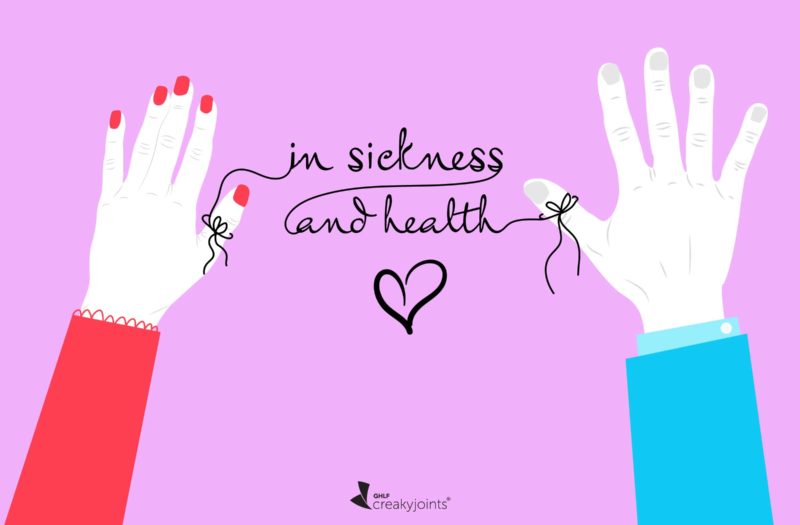Learn more about our FREE COVID-19 Patient Support Program for chronic illness patients and their loved ones.
My name is Ned Sheppa. I am one of the lucky people who is able to shrug my shoulders at the coronavirus scare. I am in my thirties, go on long hikes, and have a great immune system. I’ve also been in the service industry for more than 20 years, so I’m no stranger to keeping myself sanitary.
If I get sick, chances are, I’ll be just fine.
But, before anyone rolls their eyes, I have a brand-new problem. One of CreakyJoint’s contributors, Jennifer Walker, is a woman I fell in love with last year. She has several autoimmune diseases, including rheumatoid arthritis, ankylosing spondylitis, Raynaud’s, fibromyalgia, and more things I don’t know how to pronounce. I was not familiar with autoimmune diseases before I met her.
Being her boyfriend has opened my eyes to concerns — possibly life-threatening concerns — that I wasn’t ready for with COVID-19. My everyday routines that I take for granted have to be changed. It is a struggle to keep up with what I can and cannot do, especially as public health recommendations change by the day. I want more than anything to keep my girlfriend safe. But old habits die hard.
An Old Routine, and New Concerns
I’m used to the usual. I wake up, pack her lunch. I make her a smoothie to balance her blood sugar. Two protein bars and a couple oranges for snacks. I got her wonderful dog Edgar down to a rhythm of three walks a day. I cook for her and I am by her side when she is flaring. I have had to help her walk, change her clothes, walk Edgar when she could not, and keep her spirits up when she was struggling. But she is fun, witty and smart. I love being with her. This is life and I’m happy about it.
Now comes the concern. San Antonio and Texas are now officially in a state of emergency — heck, technically the country currently is. As with the rest of the country, self-quarantine is suggested for those in the high-risk category for coronavirus complications.
Thankfully, she was given the ability to work from home.
On plus side, she does not have to associate with the public.
But the downside… the scare.
I’m living with someone who is self-quarantined and who I could unknowingly hurt. What happens if I show signs of the coronavirus? What part of my daily habits are neither one of us even noticing that could put her at risk?
These are my fears now.
Old Fears vs. New Fears
Being in love with Jen, whose health is so fragile, always comes with some fears for me: fear of serving the wrong food (she needs to follow a low-FODMAP diet to help with her digestive issues, cannot eat gluten, and is lactose intolerant); fear of not noticing her RA flares and asthma struggles early enough.
We try to overcome these fears with education and support. She makes sure I come with her to doctor visits because I ask questions. I learn more every time I go to appointments with Jen. I help her remember details when she is often in a brain fog and struggling to function during visits. I get involved to be sure she is where she needs to be and is taking care of herself as much as I can. I take care of her.
But I worry now that I could be the one to harm her. It’s a strange feeling when I’m used to feeling like I’m the only one who knows how to help her.
Caregiving During COVID-19
I know I have to change my life. And I know it’s going to be a struggle. Like all of us helping loved ones in this immunocompromised and vulnerable community, it sucks because we are new at this. But we want to know what we can do, and I am happy to do it. So, no more daily trips to the store to cook fresh food. Our pantry is a bomb shelter. Cans and boxes for days!
I wash my hands before I touch my face and whenever I come inside. I don’t eat out of bags in my cart at the grocery store anymore while I am shopping, like the cave man that I usually am. I clean at home to help reduce her risk. I go to the grocery store when it isn’t as busy to reduce bringing coronavirus back home to her. We are working through how to mentally and emotionally handle this self-quarantine.
We will get there.
CreakyJoints has been very professional and progressive about what to do for patients with the coronavirus pandemic. If anyone is out there on the other side of it like I am — feeling out of their depth — you are not alone. Ask your loved one questions and look for resources that help with how to protect them. Jen always wants to explain things to me, and CreakyJoints is a great source of dedicated people trying to promote the patient voice. They are constantly updating the necessary social distancing practices, handwashing techniques, and things you can do for your loved ones.
It’s OK to be scared about what to do. But it’s never wrong to talk, ask questions, and be informed.
We are all in this together.
Get Free Coronavirus Support for Chronic Illness Patients
Join the Global Healthy Living Foundation’s free COVID-19 Support Program for chronic illness patients and their families. We will be providing updated information, community support, and other resources tailored specifically to your health and safety. Join now.






